Judging from the completed film, if life is a journey, Zhang Lu, a Korean director who is over 60 years old, has shown respect and affection for his past experiences and the "stations" where he has stayed for a long time, and he often reflects and reflects on them. A complex attitude of constant reflection. It can be seen from multiple interviews that under Zhang Lu's gentle and elegant appearance, he has very persistent and unique insights into art and life, such as "the film space must be faithful to the real trajectory of life" and "a person's temporality is his emotional flow rate"... The implementation of these thoughts in the work is the artistic expression that the director constantly explores with light and shadow.

"Light of the White Tower" poster
Zhang Lu is not a film major. He was engaged in literary creation while teaching Chinese at Yanbian University. When he was in his forties, he began to use images to express the ambiguous state of existence of modern people that is difficult to process with words. Although the films he writes and directs are not directly based on his own experience, and he will not deliberately interfere with the fate of the characters in the play with his director's will, the film still deeply imprints Zhang Lu's unique humanistic spirit and aesthetic style. The creative habits shown in many works, such as paying attention to the daily life of ordinary people including those on the margins of society, the use of poetry, dialect, and music, the emphasis on the body language of characters, the continuation of emotions derived from the blank space in the composition, etc., etc. The root is his respect, sincerity and sensitivity to the characters and their living space.
So far, Zhang Lu's film creation can be divided into three stages: entering the film industry from Yanbian to Beijing, teaching at Yonsei University in South Korea, and returning to the Chinese film market. In previous works, Zhang Lu has told multiple stories that took place in his hometown of Yanji and his place of residence in South Korea. They dealt with serious themes such as ethnic identity, social changes, and the living conditions of marginalized people. They were full of a cold, restrained, alienated, yet strong and delicate emotion. halo. In his new work "The Light of the White Tower", Zhang Lu looks back at Beijing, where he has lived for many years, and uses the audio-visual style of prose to tell the story of the middle-aged anxiety of the male protagonist Gu Wentong, who seems to be ambiguous but actually has nothing to do with Fengyue.

Stills from "The Light of the White Tower"
It is also about self-identity, but unlike Hollywood films such as "American Beauty", "Weatherman" and "Revolutionary Road" that intensely and sharply "dramatize" the mid-life crisis, Gu Wentong in "The Light of the White Tower", Like a frog, he is boiled by the bleak life. He was polite and courteous to his ex-wife, relatives, friends, tenants and even passers-by. The most repetitive lines he said were "I'm sorry" and "I'm sorry." His several relationships after the divorce also ended without any problems in being polite. The politeness here includes the etiquette and propriety in the old Beijing culture, the reserve and self-esteem of intellectuals, the maturity and sense of middle-aged people, and the self-protection created by modern urbanites with a sense of boundaries.
Relying on the safe distance formed by politeness, Gu Wentong finds it difficult to reveal his sincerity to others and himself. On the other hand, perhaps it is this "insensitivity" to life that can help him seemingly calmly survive the career gap from poet to food blogger, the failure of his marriage due to his wife's cheating and divorce, and deeper emotions. Lack, that is, the sense of alienation in life brought about by the incomplete father-son relationship. In fact, the so-called anxiety in middle age often comes from comparison. Standing in the middle of life, one does not have the passionate ideals of a young newborn, nor does one have the sophistication and open-mindedness of an old man. After being scorned by society, he has lost his enthusiasm for ordinary life. He is trapped in desires, expectations and unwillingness all day long, and gradually deepens his self-doubt. In the film, Gu Wentong's peaceful middle age is exactly where two uninvited guests, an old man and a young man, suddenly appear, breaking Ah Q's self-deceptive illusion and forcing him to sincerely face himself, the present and the past.
Ouyang Wenhui, a young photographer whom I met through work, is smart, kind, and enthusiastic. Like most young people in their twenties, they are curious about the world, independent, independent, and proactive in expanding their life circle. Gu Wentong was infected and inspired by her, and showed a childlike innocence when they got along, and then more peacefully accepted his inappropriateness in the worldly and utilitarian sense; the old man was Gu Wentong's father. Guangming was kicked out of the house by his mother, but secretly he always cared about his family. Driven by Ouyang Wenhui, Gu Wentong walked into his father's life with resentment, confusion, curiosity and longing for father's love. In the end, he was influenced by the old man's happy-go-lucky mentality and the past was like a smoke. He understood his father and reconciled with himself. .
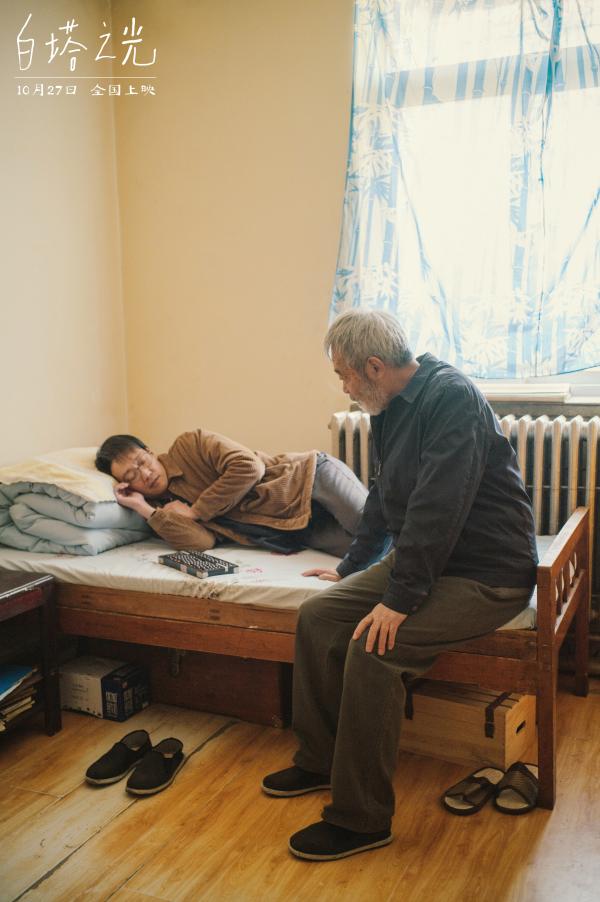
Stills from "The Light of the White Tower"
Such a film does not have many dramatic conflicts, is not bloody, sensational or brain-burning, but it is not boring to watch. The director controls the narrative rhythm of the film very naturally and smoothly. The picture on the screen is like a slowly flowing river, filled with fragments of time and emotions, slowly accompanying the audience into Gu Wentong's spiritual world. All the characters in the entire film, with Gu Wentong as the core, Ouyang Wenhui, his father Gu Yunlai, his relatives, friends, and even his daughter in elementary school, are all in a gray area of loneliness and helplessness. The description of individual circumstances, complex emotions and the lamentation of life are the profound and charming aspects of the film.
As a foil for middle-aged anxiety, Ouyang Wenhui is full of confusion about life just as the actor Huang Yao understands. Gu Wentong's attraction to her lies in his unhurried and scholarly attitude. In this era of rapid changes, he retains a certain sense of security. It lies in the laziness of all his clothes paired with Beijing cloth shoes, which exudes a certain sense of security. The persistence of idealism lies in Gu Wentong's strong sense of loneliness. Ouyang Wenhui, on the other hand, looks free and lively, but what she tries hard to hide is the sense of wandering brought to her by her experience of being adopted as an orphan. Two people with the same disease are attracted to each other, their friendship stops, and they go from loneliness to loneliness again. On the father's side, his many years of self-exile life have long made him accustomed to the company of old posters and old movies. His only hobby is flying kites, which allows him to feel the freedom symbolized by the wind and at the same time repose his nostalgia for the past family time. . Perhaps because he cared, Gu Wentong, who was gentle and let nature take its course, only seemed hesitant and cold towards his father. In his dream, he asked his father whether he had made any mistakes back then, and the answer was no. There is no trace of the truth, and it is no longer even important. The high price a person has paid for it and the wasted half of his life are truly lamentable.
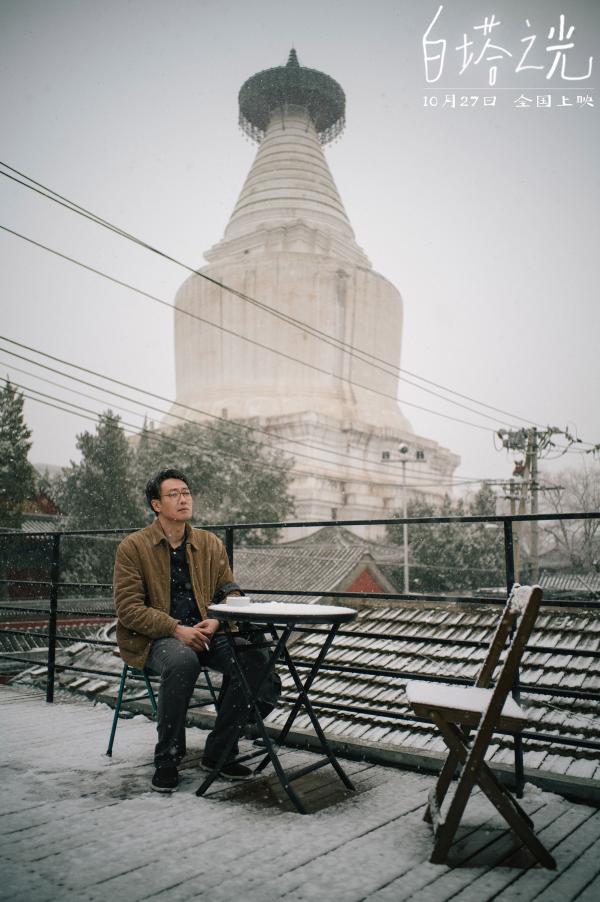
Stills from "The Light of the White Tower"
Director Zhang Lu has mentioned his unique creative method or concept in many interviews. When he writes a story, he must first have a feeling for a certain space. Only with the "soil" of the space can the characters and plots be "generated". . Actors who have worked with him also mentioned that directors often have to clear the scene first, spend ten minutes alone to fully communicate with the location, and then continue working after finding the feeling. Perhaps due to the meticulous observation and charming capture of the activity space, the characters in Zhang Lu's films simultaneously present real real life and a complex spiritual world. In line with this, the name or meaning of "Light of the White Tower" also has a double meaning. On a material level, the White Tower is particularly eye-catching among the gray-toned buildings in Beijing’s old city. On a symbolic level, the White Tower’s abruptness can be a sign of spiritual independence. It has no shadow, and can also represent a philosophy that penetrates the secular world.
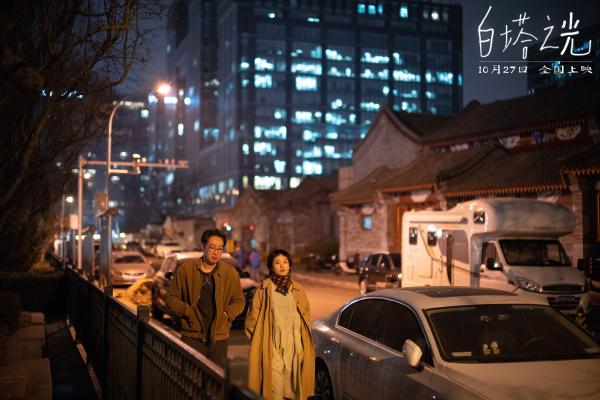
Stills from "The Light of the White Tower"
Zhang Lu specially set up multiple spaces for "Light of the White Tower". The first level is real space. The director chose the location near the White Pagoda of Miaoying Temple in Xicheng District, Beijing, which he is most familiar with, to depict the changes of the times through Gu Wentong and Ouyang Wenhui's wanderings in celebrities' former residences, cafes, stew shops, folk houses, B&Bs, and film archives. , Beijing literature and art are both romantic and pyrotechnics. At the same time, compared with the modern and prosperous Wangjing near Gu Wentong's sister's home, it outlines the complex and diverse face of Beijing in the course of history. And by using the older Gufu Dwelling in Beidaihe, the orphanage where Ouyang Wenhui lived as a child, which is being demolished, to explore the impact of the environment on people's spiritual world; on the second level, with the help of the poet Shizhi's poem "This is Four Points and Eight" "Beijing", the emotional space created by the Olympic theme song "Beijing Welcomes You". When Gu Wentong's daughter's childish and crisp poetry recitation sounded, when Gu Wentong and a group of middle-aged classmates drunkenly sang endlessly and lonely songs, the dimension of history opened up, and the individual's small hopes were lost, joys and sorrows gathered and dispersed, in the face of the times and destiny. They are all like the wind blowing through the valley, leaving a sigh; on the third level, thanks to the director's unique vision of casting, the performances of the three leading actors Tian Zhuangzhuang, Xin Baiqing, Huang Yao, including Wang Hongwei, Li Qinqin, Zhang Xianmin, Nan Ji and other actors have constructed an open Space. It not only invites the audience to enter the film world and empathize with the characters, but also uses the actors' own experiences and past roles to remind the audience that there can be some kind of tacit intertextuality.
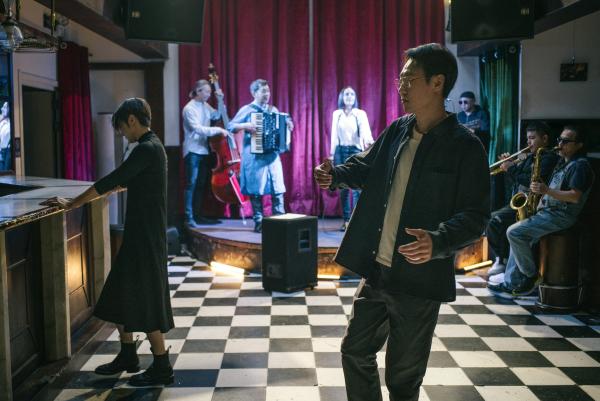
Stills from "The Light of the White Tower"
A good movie is like wine. The white wine is like "Swordsman", which is mellow and sweet, from the soles of your feet to the top of your head. The red wine is like "In the Mood for Love", with a lasting flavor that lasts for three days. "The Light of the White Tower" is like rice wine. It has a homely taste, but its staying power cannot be underestimated. There are always some fragments and emotions that will suddenly flash back in the ordinary life of Chaimi from time to time, unknowingly like a ray of light. out.
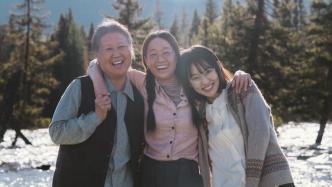
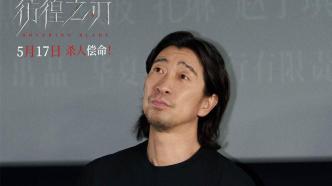
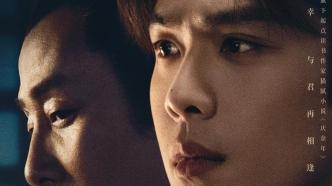
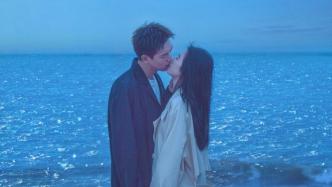


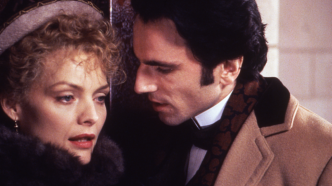
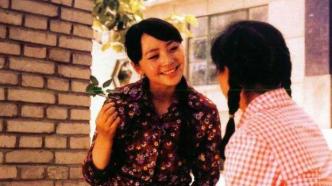
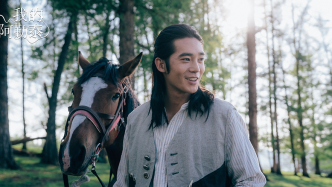

Comments